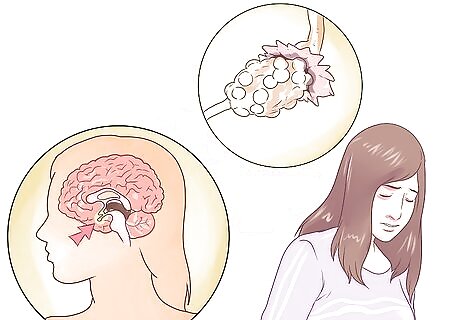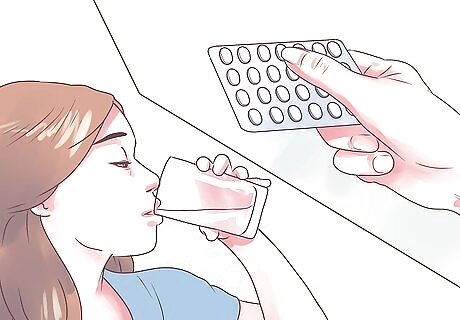
views
Undergoing Medical Tests and Treatments

See your doctor for FSH testing and diagnosis. A simple blood test can determine whether your FSH levels are higher or lower than normal for your circumstances. If the test reveals abnormal FSH levels, your doctor will use additional testing to diagnose the underlying cause(s) before developing a treatment plan with you. In males, normal FSH levels range from 1.4 to 15.5 IU/ml. The range for females is much wider, depending on their age and menstrual cycle. To diagnose the cause of abnormal FSH levels, your doctor may look at hormonal panels that compare the level of certain hormones in the body (such as GnRH and estrogen), or they may do a biochemical analysis, which looks at enzymes and other substances that affect the operation of certain organs and glands. In certain situations, you doctor may turn to radiographic methods to diagnose the cause of abnormal FSH levels, such as ultrasound, CT scan, and MRI.

Familiarize yourself with conditions that can impact FSH levels. FSH levels are determined by a complex and delicate network of hormones. Therefore, there are a large number of conditions that can affect your body's production of FSH. These underlying conditions must be identified and treated in order for FSH levels to return to normal levels. Some of the most common conditions that can impact FSH include: Aging: In females, FSH levels naturally increase during their 30s and 40s as menopause approaches. High FSH levels negatively impact fertility. Polycystic ovarian syndrome: With this condition, there are multiple cystic follicles in the ovaries, which leads to the excessive production of estrogens and androgens. High levels of these hormones can significantly lower FSH levels. Hypopituitarism: With this condition, the function of the pituitary gland is suppressed, which can greatly affect the levels of FSH, since this is where FSH is produced. Hypogonadism: As a result of many different syndromes, the diminished functional activity of the gonads (testes in males and ovaries in females) can interfere with FSH levels. Tumors: A tumor in one of several different locations—such as the pituitary gland, the ovaries, or the testes—can cause abnormal FSH levels.

Follow the therapy regimen recommended by your medical team. The specific treatments can vary widely, based on your current FSH levels, the underlying causes, and your specific circumstances—for instance, if you’re a female in your late 30s and are trying to get pregnant. If you’re undergoing fertility treatments, you’ll need to follow a very specific regimen, which may include injections and/or pills, to manage your FSH levels. In some cases, you may be prescribed hormone replacement therapy (HRT). HRT involves using medication in tablet, topical gel, skin patch, or vaginal ring form to adjust the levels of hormones such as estrogen, progesterone, and testosterone. This adjustment can, in turn, improve your FSH levels. Whatever treatments you are prescribed, it’s essential that you follow your medical team’s instructions to the letter. Don’t be afraid to ask questions, get clarifications, or request demonstrations.

Undergo surgery, if necessary, to remove any tumors or cysts. In some circumstances, abnormal FSH levels are caused by a tumor or cyst on the ovaries, testes, or pituitary gland. Keep in mind that most cysts and tumors are not life-threatening, but having them removed surgically may improve your FSH levels and address other medical issues you may be experiencing. The complexity of the surgery and the risks involved will vary greatly based on your specific circumstances. Discuss your condition and your options with your medical team so that you’re informed and prepared.
Trying Foods and Supplements to Lower FSH Levels

Eat more foods containing omega-3 fatty acids. Omega-3 fatty acids are important in the production of hormones in the body, which may in turn improve FSH levels. There is some evidence that increasing omega-3 intake through diet or supplements may decrease elevated FSH levels in some cases. Although some studies support the use of Omega-3 fatty acids for lowering FSH levels, more research needs to be done to determine whether it is safe and effective. Talk to your doctor before trying to adjust your FSH levels with any type of dietary, supplementation, or lifestyle change program. Medical intervention is usually the best option, and it’s important for your doctor to be informed about any other treatments you’re using. Good food sources of omega-3 include oily fish (salmon, trout, mackerel, sardines, herring, and anchovies), walnuts, flax seeds, seaweed, and kidney beans, among others. Omega-3 supplements are also available.

Consume more dark green leafy vegetables. Dark green leafy vegetables provide the body with a range of vitamins and minerals that support a healthy endocrine system, which, in turn, may help improve your FSH levels. Dark green leafy vegetables include kale, spinach, broccoli, and cabbage, as well as sea vegetables like nori, kelp, and wakame. Although some studies support consuming Dark green leafy vegetables] for FSH levels, more research needs to be done to determine whether it is effective. Your doctor may advise you to eat at least five portions of these foods per day. This can be done by blending kale into a morning smoothie, eating a green salad for lunch, and including at least two portions of green or sea veggies with dinner. If you’re on a blood thinner, you may need to avoid eating dark green leafy vegetables. Talk to your doctor.

Introduce more ginseng to your diet. Ginseng may help to support and nourish the pituitary gland and the hypothalamus, both of which contribute to your FSH levels. You can take ginseng as a supplement—your doctor may advise you to try taking two 500mg capsules twice per day, for instance. Although some studies support the use of Ginseng for FSH levels, more research needs to be done to determine whether it is safe and effective. You shouldn't take more than the recommended dosage of ginseng, as it can affect the blood's ability to prevent clotting.

Take a recommended dose of maca each day. Maca is a root vegetable that grows in high altitude areas that have intense sunlight and may help to improve your FSH levels. Maca can be found in supplement form, and the recommended dosage is often 2000-3000mg per day. Although some studies support the use of Maca for FSH levels, more research needs to be done to determine whether it is safe and effective. Talk to your doctor about taking maca supplements, and what your ideal dose should be.

Take vitex capsules daily, if recommended. Vitex is an herb that may help regulate the pituitary gland, in turn helping to balance the production of hormones in the body. There’s some evidence that vitex may help lower FSH levels in some cases. Although some studies support the use of vitex for FSH levels, more research needs to be done to determine whether it is safe and effective. Vitex can be taken in supplement form, and the recommended dosage is often 900 to 1000mg daily. Be aware that vitex capsules work best on an empty stomach, and therefore should be taken early in the morning before breakfast.
Using Lifestyle Changes to Possibly Lower FSH Levels

Maintain a healthy weight to improve your likelihood for normal FSH levels. Maintaining a healthy weight contributes to the appropriate production of FSH and other hormones. Being overweight can, in some cases, contribute to elevated FSH levels that may negatively impact fertility. Alternatively, being severely underweight may in some cases decrease FSH levels to such a degree that fertility is negatively impacted. Women who are athletes are at higher risk for turning off or shutting down FSH production. Generally speaking, a healthy weight is defined as having a BMI between 18.5 and 25. However, you should always consult with your doctor to determine your ideal weight goals and how best to get there. If you need to lose weight, work with your medical team to focus on healthy measures like exercising more and eating nutritious foods. Expert Answer Q When should FSH be high? Joshua U. Klein, MD, FACOG Joshua U. Klein, MD, FACOG Board Certified Reproductive Endocrinologist Dr. Joshua U. Klein is a board certified Reproductive Endocrinologist, an Assistant Clinical Professor at the Icahn School of Medicine at Mount Sinai, and the Co-Founder of Extend Fertility. He specializes in IVF, egg freezing, infertility, fertility preservation, artificial insemination, and treating polycystic ovarian syndrome (PCOS). Dr. Klein has been published in numerous peer-reviewed academic journals such as Science, Fertility and Sterility, and Obstetrics and Gynecology. He holds a BA in English from Yeshiva University and an MD from Harvard Medical School. Joshua U. Klein, MD, FACOG EXPERT ADVICE Answer from Joshua U. Klein, MD, FACOG: FSH should only be high if you're in late 30s, early 40s, or older, since these age groups have a lower egg supply. Women younger than their mid-30s or younger should have a high egg supply and definitely shouldn't have elevated FSH.

Reduce excess stress to manage FSH and other hormone levels. When you are feeling stressed out, your body releases stress hormones (such as cortisol), which can in turn throw your FSH and other hormone levels out of balance. Therefore, reducing stress may help to improve your FSH levels. To decrease stress, you can use relaxation methods such as deep breathing, yoga, meditation, light exercise, walking in nature, listening to calming music, reading a relaxing book, taking a warm bath, or talking to an old friend. Find the methods that work best for you. Getting enough sleep is another important factor in reducing stress.

Try fertility massage to possibly improve FSH levels. A relaxing massage can certainly reduce stress, and there’s some evidence that stress reduction can improve FSH levels. However, there’s no real evidence that a specific “fertility massage” will provide particular benefits. Keep this in mind before booking a massage with a practitioner who offers fertility massage sessions. While some people think fertility massage has a positive effect, current research does not support its use. You may instead try self-massage to potentially stimulate the glands that manage FSH and other hormones. Try using gentle circular motions to massage your lower abdomen for 10 to 15 minutes each day. If you don’t mind the lack of scientific evidence supporting it, you might also try rubbing the ball of your big toe. In reflexology, the big toe is linked to the pituitary gland, which is essential for balancing hormone production in the body.

Evaluate fertility cleanses carefully before considering this option. A quick search online will reveal numerous at-home and in-clinic options for “fertility cleanses,” which claim to cleanse excess hormones from the body. Supporters claim that cleansing before trying to get pregnant can increase your chances of success. However, there’s no reliable medical evidence to support this, and these "cleanses" can often present serious health risks, contrary to their claims. Talk to your medical team first if you’re considering doing a fertility cleanse to improve your FSH levels and other fertility markers. Make sure you’re fully aware of any risks involved before deciding whether to proceed.



















Comments
0 comment